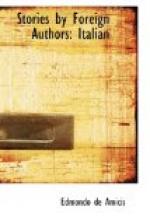The hour was striking in the clock tower. The voice of the clock was dear to him by night. His rugged heart softened somewhat, and Satan saw his chance to show him the peaceful little church surrounded by the cypresses, his own, all his own, and a certain fig tree that was dear to him under the bell-tower; he made him feel the sweetness of the cells rendered holy by so many pious souls of old, the sweetness of living in that quiet niche of St. Luke, so well suited to his humble person, in the exercise of a ministry of deed and of word, without worldly aims and without responsibility of souls. Satan further showed him the difficulty of finding a good place; reminded him of the needs of his old father and his sister, poor peasants, one of them now too old and the other too infirm to gain their livelihood by working. And Satan finally turned casuist and sought to prove that, without betraying the secret, he could still send away the servant on some pretext, or even with none. But at this suggestion of profiting by the confession Don Rocco raised such a frightful frown that the devil fled without waiting for more. Let him keep Lucia, then, and let her see to it that she followed the sacred text: Nemo potest duobus dominis servire. Just see how the words of holy writ fitted the occasion! Don Rocco sought to mentally stitch together the last sentences of his sermon, but it was too fatiguing an attempt for him. He might have succeeded, however, had he not fallen asleep in the midst of a most difficult passage.
III.
He slept little and arose at dawn. Before going down he stepped to the window to consult the weather. In stepping back his eyes fell on the entrance to the cellar. It was open.
Don Rocco went down to the cellar, and came out again with a most unusual expression. The wine was no longer there. Neither wine nor cask. But outside there were fresh marks of wheels.
Don Rocco followed these as far as the main road. There they disappeared. There remained but a short curve from the edge to the middle of the road into the labyrinth of all the other wheel tracks. Don Rocco did not think at that time to go in search of the authorities in order to make a complaint. Ideas came to him very slowly, and perhaps this particular one would not be due before midday.
On the contrary he returned, wrapped in meditation, to St. Luke. “Those blows,” said he to himself, “that stone thrown! It is fortunate that the Moro was with me then; otherwise, he would have been suspected.” He went back to the cellar entrance, examined minutely the fractured door, contemplated the place where the cask had stood, and, scratching his head, went into the church to repeat some prayers.
IV.
At Mass there was a crowd. Both before and after it there was a great deal of talk of the theft. Everybody wanted to see the empty cellar, the broken door, the traces of the wheels.




